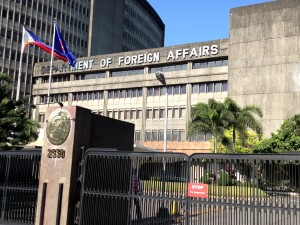Filipinos in Mideast urged to take precautions vs MERS virus
MANILA, Philippines—While no restrictions have been imposed on travel to the Middle East, the Department of Foreign Affairs continues to advise Filipinos in the Arabian Peninsula to take precautionary measures amid the continuing threat of the deadly Middle East Respiratory Syndrome–Corona Virus (MERS-CoV).
In public advisory issued jointly with the Department of Health, the DFA said Filipinos in the Middle East should take care of their health, particularly those working and residing in the United Arab Emirates and Saudi Arabia, where deaths due to the virus have been recorded.
“Currently the World Health Organization has not declared any outbreak or epidemic of MERS-CoV in the Middle East. There are no travel restrictions to and from the Arabian Peninsula. Despite these, we are encouraging Filipinos in the Middle East to practice the precautions below for their own protection,” said the public advisory released Monday afternoon.
The advisory was released as the government continued to account for passengers of Etihad Airways Flight No. EY 0424 that arrived on April 15 carrying a Filipino nurse who had been exposed to the virus at a Middle Eastern hospital.
The nurse was already cleared of the virus, along with some 241 other passengers who were declared free of the illness. As of Monday, the government was still trying to locate 174 other passengers who have yet to be tested.
In the advisory, the DFA and DOH reminded Filipinos to practice proper hygiene, particularly through handwashing or use of hand sanitizers before and after eating and before and after preparing food, among others.
The agencies also urged Philippine citizens living or working in the Middle East to observe proper etiquette while in public, particularly covering the mouth and nose while sneezing or coughing, then washing their hands. Those with respiratory illness should remain indoors and wear a surgical mask to avoid transmission.
Filipinos should also avoid contact with farm and domesticated animals, particularly camels, which are believed to be carriers of the virus. Contact with those known to be infected with the virus should be avoided.
Health workers who are exposed to patients with MERS-CoV must “comply with local health regulations and postpone any trip abroad until after test results are negative,” the advisory said.
The DFA and the DOH also advised Filipinos not to panic and to disregard rumors about the spread of the virus, including supposed warnings by UAE health authorities for the public to avoid public places that are “believed to be hotspots for the new killing virus.” Abu Dhabi has denied issuing any statement with such warning.
Last week, one Filipino worker died of the virus in the UAE, while five others were reported to be in stable condition at a hospital.
The virus, which stems from the same viral family as the Severe Acute Respiratory Syndrome, has killed 93 of the 243 confirmed cases worldwide since March 2012, according to the World Health Organization.
RELATED STORIES
18 Central Luzon residents on Etihad flight test negative for MERS
Gov’t assures public on MERS-CoV: Don’t panic
